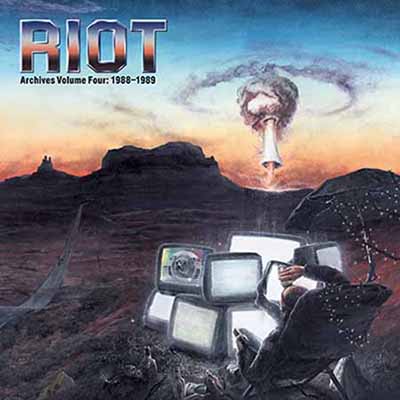 | ||||
| RIOT - Archives Volume 4: 1988-1989 DLP+DVD | |
HRR 571, ltd 750, 100 x silver vinyl (HRR Mailoder exclusive), 350 x transparent blood-red vinyl + 300 x black vinyl, gatefold cover, bonus DVD Live in Kobe 1990 | |
| Tony Moore - Vocals Mark Reale - Guitars Don Van Stavern - Bass Bobby Jarzombek - Drums | |
| 01 On Your Knees 02 Runaway 03 Killer 04 Storming the Gates of Hell 05 Maryanne 06 Racing with the Devil (On a Spanish Highway) 07 Smoke On the Water (Alternative version) 08 Killer (Joe Lynn Turner) 09 Dance of Death (Demo) 10 Black Leather & Glittering Steel (Demo) 11 Runaway (Demo) 12 Smoke On the Water (Demo) 13 Maryanne (Vocal Recording) | |
AVAILABLE | |
As a founding member of San Antonio Texas legends S.A. Slayer, bassist Don Van Stavern is the longest lasting member of Riot V. The first Riot album he plays on is 1989’s legendary »Thundersteel« record. However, not a lot of people know that his personal connection to Mark Reale goes way back even further, to 1983’s »Born In America«, featuring the late great Rhett Forrester: “ There’s actually three songs on »Born In America« that I co-wrote but didn’t get any credits for. At the time of »Born In America« I was already writing with Mark Reale. I wrote ´Gunfighter´, I wrote ´Heavy Metal Machine’ with him, and I wrote ‘Running From The Law’. And I have demos of that. Because what we would do is, we would get the songs down and then we would demo with the guys from Texas Slayer. That later became Narita. But ´Gunfighter´,´Heavy Metal Machine’ and ‘Running From The Law’ were already written. That’s where our relationship for writing actually started.”
With songs like “On Your Knees”, “Runaway”,”Storming The Gates Of Hell” or the striking “Killer” (with vocalist Tony Moore singing a duet with none other than the mighty Joe Lynn Turner) »Riot Archives Vol.4« contains the original demo versions of a lot of material which later ended up on »The Privilege Of Power« album (from 1990).
Don Van Stavern compares the rough demo takes of the »Privilege Of Power« material (recorded in Texas) to the finished album versions (laid down in New York City): “The producers wanted to put a bunch of stars as guest musicians on the album, that was the deal, and they wanted to put horns on there. That was okay. But then they put the noise in-between each song, the little intros, and then a long intro. And then the song would finish and there would be another long intro. A lot of fans said: ‘We just wanna hear the music, we don’t wanna hear that.’ That was one of the things we didn’t really like about the finished version of »The Privilege Of Power«. The horns were cool but we didn’t like the bits and pieces in-between the actual songs.”
Matthias Mader



